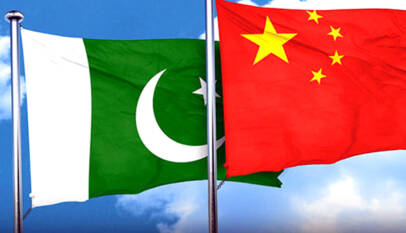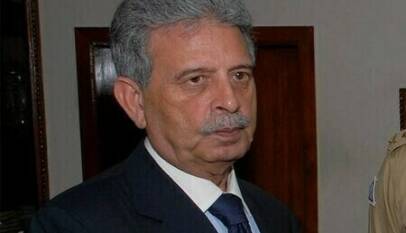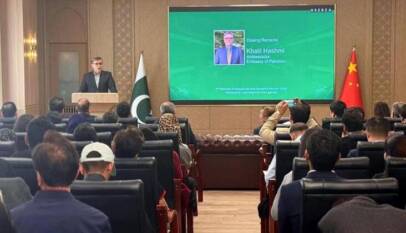President Asif Ali Zardari will leave for China today
President Asif Ali Zardari will undertake a state visit to China from February 4-8 at the invitation of President Xi Jinping, marking his first visit since assuming office in March 2024. The visit will focus on strengthening Pakistan-China ties, particularly in economic, trade, and security cooperation, including discussions on CPEC and regional connectivity. Zardari will meet Chinese leaders, including President Xi and Premier Li Qiang, and attend the 9th Asian Winter Games in Harbin. The visit underscores Pakistan’s commitment to its strategic partnership with China, especially amid security concerns affecting CPEC projects. Meanwhile, Foreign Secretary Amna Baloch visited Iran to discuss regional cooperation and attended the first High-Level Committee meeting on ECO reforms, emphasizing Pakistan’s commitment to regional trade and connectivity through ECOTA and ECO Vision 2025.
ISLAMABAD: President Asif Ali Zardari is to kick off a state visit to China from tomorrow February 4-8 at the invitation of Chinese President Xi Jinping. Zardari’s first after taking over as president in March 2024. The Foreign Office, while asked several times, was reluctant to share names of the members of the president’s delegation.
“The discussions will encompass the full spectrum of Pakistan-China relations, with a particular focus on economic and trade cooperation; counter-terrorism and security collaboration; China Pakistan Economic Corridor (CPEC) and future connectivity initiatives. The two sides would also exchange views on the unfolding global and regional geopolitical landscape, and bilateral cooperation at multilateral for a,” said the FO while announcing the visit. During the visit, the president would hold meetings with Chinese leadership, including President Xi Jinping, Premier Li Qiang and other senior Chinese leaders.
Later on the special invitation of the Chinese government, the president would also attend the inaugural ceremony of the 9th Asian Winter Games in Harbin, Heilongjiang province of China.
Pakistan points out that the visit underscores the tradition of high-level exchanges between Pakistan and China, reflecting deep commitment of the two countries to strengthen their All-weather Strategic Cooperative Partnership. “It reaffirms mutual support on the issues of core interests, advance economic and trade cooperation including CPEC, and to highlight their joint commitment to regional peace, development and stability,” added the Foreign Office.
The visit adds great significance as CPEC, a flagship project under China’s Belt and Road Initiative (BRI), is besieged with security issues mostly pertaining to Chinese workers in Pakistan.
The visit is expected to reinforce mutual commitments on key economic and security issues, reaffirming Pakistan’s strong ties with its largest trade and investment partner. President Zardari’s trip comes at a crucial time as Pakistan seeks to revitalise its economy and strengthen regional connectivity through CPEC.
Added to this are several projects under CPEC which have yet to take off because of financial constraints, but officials appear optimistic and say new agreements could be signed during the visits deepening economic collaboration and addressing regional security challenges.
Last week, President Zardari congratulated President Xi Jinping on the occasion of the Chinese Spring Festival and the arrival of the Year of the Snake. In his message, President Zardari expressed his strong commitment to further strengthening the longstanding relationship between Pakistan and China. He conveyed his eagerness to meet with President Xi in Beijing to discuss enhancing bilateral cooperation.
The president acknowledged the resilience of the two nations as All-Weather Strategic Cooperative Partners. He highlighted the tireless efforts of successive leaderships in both countries that have contributed to the growth of their unique and robust partnership.
Meanwhile, Foreign Secretary Amna Baloch in an unannounced visit to Iran called on Iran’s Foreign Minister Seyyed Abbas Araghchi, where both sides discussed global and regional matters of mutual interest and reaffirmed Pakistan’s resolve to strengthen bilateral ties with Iran in wide-ranging areas.
The First Meeting of the High-Level Committee (HLC) on ECO Reforms and the Prospects of Cooperation in the Region was also held during the visit of the foreign secretary where she represented Pakistan.
“At the HLC, the foreign secretary presented Pakistan’s perspectives on key matters related ECO reforms. The foreign secretary stated that ECO needs comprehensive reforms, including financial and budgetary matters, enhancing efficiency of the secretariat, effective recruitment policy, and deliberation on other related matters,” said the Foreign Office.
Being the founding member of the organisation, the foreign secretary reaffirmed Pakistan’s commitment to regional connectivity and trade. The foreign secretary asserted that Pakistan attaches great importance to ECO Trade Agreement’s (ECOTA) early implementation and also would urge all member states to take a broader and more holistic view of the matter and in the earliest implementation of ECOTA.
She further highlighted the importance of ECO Vision 2025 in terms of increasing intra-regional trade and regional connectivity and also appreciated Uzbekistan’s proposed Strategic Objectives of Cooperation-2035.
She expressed that with collective and coordinated efforts from the platform of ECO, all member states can realise the true potential of the ECO in the region. Meanwhile, ECO Secretary General Asad Majid Khan, in an interview with ISNA, referring to the first high-level meeting of the Committee of Deputy Foreign Ministers of the ECO member countries in Tehran, which was held on Monday morning, said: “Almost 90 percent of the member countries were present at this meeting, which I think is significant because it shows the level of attention of policymakers in the countries towards the ECO. Therefore, we are looking forward to a very productive meeting.”
Regarding the ECO agenda on expanding trade between member countries, which was also announced as one of the goals of this meeting, he said: “For us, trade is the main goal of the organisation, and the issue of reducing tariffs in the form of ECOTA is one of the basic agreements of this organisation. We have gathered here to promote trade, to integrate the region in terms of trade and to promote mutual and collective economic development, therefore, trade is the main pillar of any development effort for the region.”
Pakistan Embassy in Beijing launches landmark mentorship programme to empower youth
The Embassy of Pakistan in Beijing on Sunday successfully organized the 2nd Pakistan Profe…











